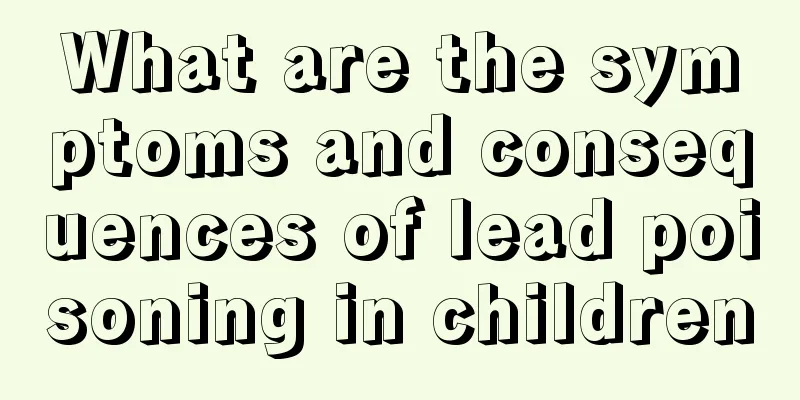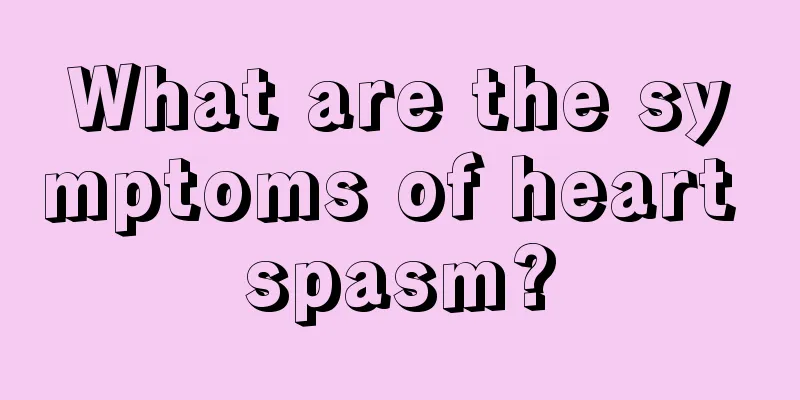What are the symptoms and consequences of lead poisoning in children

|
Lead poisoning is relatively common among children and is very harmful to their growth and development. It can cause slow growth and development, hyperactivity, temper tantrums, irritability, slow reactions, etc. These are all common symptoms of lead poisoning. If it is severe lead poisoning, it can also cause hepatosplenomegaly and circulatory failure. The harm to children's future, growth and development is very great. Symptoms of lead poisoning in children Children with acute lead poisoning have a metallic taste in the mouth, drooling, nausea, and vomiting. The vomitus is often white milk-like (lead forms white lead chloride in the stomach). They also have abdominal pain, sweating, irritability, and refusal to eat. When acute lead poisoning encephalopathy occurs, persistent vomiting (which may be projectile) occurs suddenly, accompanied by increased breathing and pulse, ataxia, strabismus, convulsions, coma, etc.; at this time, blood pressure may increase and optic disc edema may occur. The baby's anterior fontanelle is full, and even the skull sutures are widened and the head circumference increases. Children with severe lead poisoning often have paroxysmal abdominal colic, and may develop hepatomegaly, jaundice, oliguria or anuria, circulatory failure, etc. A few people have gastrointestinal bleeding and paralytic intestinal obstruction. Most of the sick children have no fever or only a slight fever. Patients with a longer illness period also have anemia, a gray (leady) face, and are accompanied by palpitations, shortness of breath, fatigue, etc. Teeth and nails may be stained black due to lead deposits, and black "lead lines" on the gums are rarely seen in young children. Numbness of the limbs and wrist and ankle drop signs at the distal ends of the limbs are relatively rare in infancy; numbness of the fingers and toes is a common symptom in older children. Sometimes limb paralysis may be seen. If intercostal muscle paralysis occurs, breathing difficulties or even respiratory failure may occur. Chronic lead poisoning is more common in children over 2 to 3 years old, and it usually takes about 3 to 6 months from ingestion to the onset of symptoms. The main manifestations are severe central nervous system lesions such as epileptic seizures, excessive movement, aggressive behavior, delayed or even loss of language function, etc., but there are no signs of acute increased intracranial pressure. Such chronic encephalopathy may be a sequela of acute encephalopathy or may be associated with frequent excessive lead intake. In addition, it should be noted that when gastrointestinal symptoms appear in the early stage of lead poisoning, it should be differentiated from acute gastroenteritis, viral hepatitis, etc.; when there is abdominal colic, it must be differentiated from acute abdomen; when signs of encephalopathy occur, it should be differentiated from encephalitis, tuberculous meningitis, brain tumors and tetany; when there are symptoms and signs of peripheral neuritis, it must be differentiated from poliomyelitis and diphtheria nerve paralysis. What is lead poisoning? Before confirming that your baby has lead poisoning, you must first understand what lead poisoning is. Lead and its compounds are toxic to all tissues of the human body. Poisoning can occur through inhalation of its vapor or dust through the respiratory tract, which is then rapidly carried into the blood by phagocytes in the respiratory tract; or it can be absorbed through the digestive tract and enter the blood circulation, causing poisoning. The poisoned people generally have a history of contact with lead and lead compounds. Oral intake of 2-3 grams can cause poisoning, and 50 grams can be fatal. Clinical lead poisoning is rare. Generally speaking, when the blood lead concentration exceeds 100 micrograms/liter, it will cause harm to health, but the child may not have any clinical symptoms at this time. Therefore, it is best to test your child's blood lead level once when he or she is 1 year old and again when he or she is 2 years old. Lead poisoning in children may manifest as hyperactivity, irritability, and temper. They may often have friction with other children and bite or hit others when they are angry. Some may also show slow reaction and even convulsions. If not treated in time, it may cause a series of complications. Poor appetite, abdominal pain, anemia, hyperactivity, and inattention have all been described as being related to lead poisoning, but these symptoms are not specific to lead poisoning. |
<<: What are the symptoms of excessive formaldehyde inhalation
>>: What are the symptoms of having a baby girl
Recommend
Why do we need lymphatic detoxification
The lymphatic system is a system used by the huma...
Sequelae of orchiectomy for prostate cancer
There are many types of prostate diseases, such a...
Does skipping rope help you grow taller?
For boys, height is an important issue. Many boys...
What are the effects of GABA
Most of the effects of GABA include concentrating...
What is albinism
Albinism is actually a common skin disease and it...
What is the reason for sagging eye bags
After the appearance of eye bags, the skin often ...
Is snow chrysanthemum cold or warm in nature? Be careful when drinking it
Snow chrysanthemum is a particularly good health ...
05cm kidney stone
The size of the stones in each kidney stone patie...
What will happen if you are severely calcium deficient
Severe calcium deficiency will have a serious imp...
Explain the common knowledge about fibroids
With the improvement of living standards, fibroid...
Can children get nasopharyngeal cancer? Who is more likely to get nasopharyngeal cancer?
The cause of nasopharyngeal carcinoma is still un...
What should I do if I have hypertrophic pharyngitis
Because the occurrence of hypertrophic pharyngiti...
Does thyroid cancer cause low chloride and low sodium?
Thyroid cancer is a malignant tumor originating f...
Gather together, the class on tips for removing frostbite scars is about to begin!
Due to the cold weather in winter, the face and h...
Is diabetes hereditary? What are the types of diabetes?
Diabetes is currently a traditional chronic disea...









